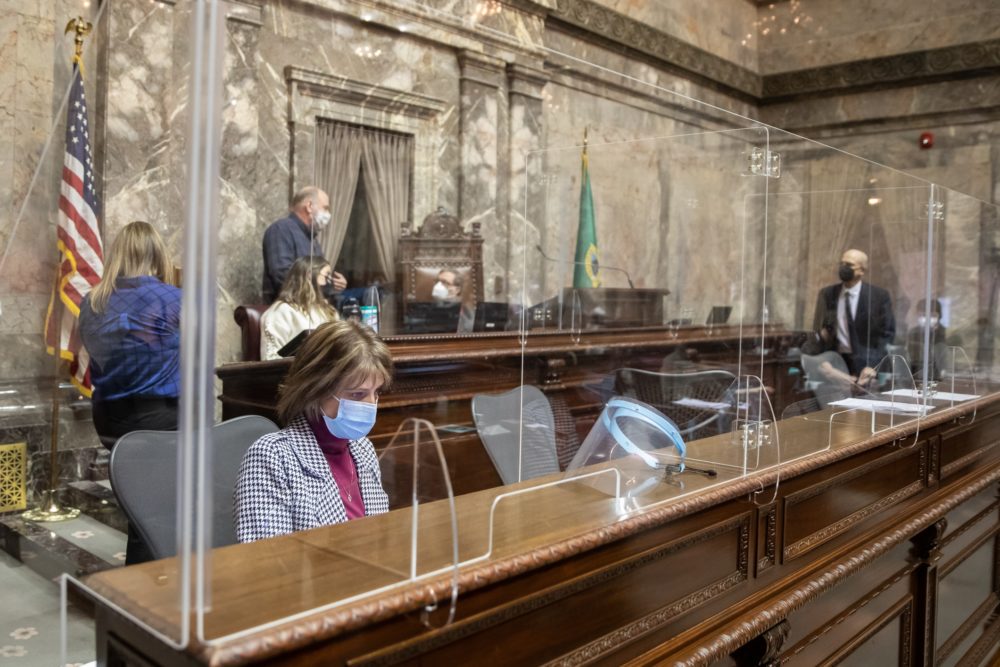
The Washington State Legislature starts its 105-day 2021 session under enormous constraints. COVID confinement rules require that virtually all the work of negotiating the biennial budget will take place on-line: committee meetings, “floor” debates, public testimony, voting on bills . . . an unprecedented challenge for the people who underpin the on-line machinery of government.
Brad Hendrickson has been training for the challenge for 20 years. The morning of February 28, 2001, he was settling into the job of deputy to the Secretary of the State Senate when the earth shook violently for more than a minute, leaving the Capitol Building in large part too unsteady for human occupancy.
In those days Secretary of the Senate was a pretty routine job: keeping track of the status of proposed legislation on their way to passage or the oubliette — a paper-chase, basically. But with both houses of the legislature crammed into the one undamaged chamber, it became instead an uncomfortable, irksome, temper-tinged test of patience. But the job got done, in large measure because the Office of the Secretary of the Senate kept it on the rails.
After that challenge in 2001, the Office returned to its accustomed invisibility, while its responsibilities have grown, literally, exponentially. Planning for disaster became a basic charge. As electronic communication grew customary, then unavoidable, the Office extended tendrils to support the new wired world. As security became less and less dependable, expertise in keeping malware, hostile bots, and live hackers out of the system rose to primary place of concern.
Today Hendrickson is himself the Senate Secretary, with an office of more than 70 specialists laboring under him. With luck, the lessons of the past 20 years will enable home-bound lawmakers and their gaggles of staff to execute their responsibilities, albeit irritatingly trammeled, to allow ordinary citizens who want to put their views on proposed legislation forward to feel certain they’ve been heard.
Not everyone hoping to influence legislation feels supported under the new communication régime. Every legislator now carries an official phone, to be used whenever conducting the public’s business. The logs of said phones are archived and accessible to public enquiry. For the first time lobbyists have to take into account that their every call to a legislator is going to be on record. Well, perhaps not all; legislators are human, and in my experience it’s not too hard to procure their private number.
Even the most punctilious sometimes rue the continuous exposure to the public record. “In the past, we could grab a private moment with each other, over coffee, in the hall between committee meetings,” Karen Keiser, president pro tem of the Senate told me. “I know I’m going to miss those little moments when you could exchange a few words in private with an opponent on some issue, maybe smooth the way to finding a compromise and expediting the progress of a bill.”
But what’s past is past, with no apparent way to return to the bad old but better-oiled ways to achieve concord. So 2021 is the year when government, like it or not, became open to all. Almost every aspect of the legislative machine has had its cover-plates removed.
Legislation has been compared, unfavorably, to the making of sausage. Well, welcome to the back room of the butcher shop. No one can claim now that they can’t trust politicians to pursue the general good. It’s your job to make sure they toe the line. You have the tools; are you going to use them? To help citizens to participate, here is some advice sent along by Aaron Wasser, communications director for the Senate Democrats:
Universal remote testimony: The Legislature has expanded remote testimony capabilities so people can testify on any bill from anywhere up to an hour prior to a committee meeting.
To testify remotely in the Senate: https://app.leg.wa.gov/CSIRemote/Senate.
To testify remotely in the House: https://app.leg.wa.gov/CSIRemote/House
Submit written testimony: People can also submit written testimony on any bill scheduled for a public hearing. People have long been able to submit written comment on a bill, but prior to this year, those comments were sent directly to the constituent’s own legislators. The new written testimony system saves comments where committee members and staff can access and read it, and where committee staff will later place it in the committee file and archive it where it will be maintained as part of the public record.
Written testimony can be submitted at the same links used to sign-in for public testimony above.
Set up a Zoom with your legislator: Due to Covid-19 protocols, legislators won’t be meeting in person with constituents, but people are encouraged to schedule Zoom meetings with their senators and representatives.
To find your legislator’s contact information and schedule a meeting: https://app.leg.wa.gov/MemberEmail/
It’s all on TVW: As always, every committee meeting, floor session, press conference and special event will be broadcast at TVW.org. Also, Here’s an article from Crosscut with some more information.
Discover more from Post Alley
Subscribe to get the latest posts sent to your email.
